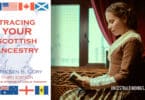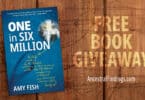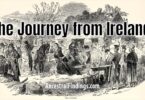This giveaway has concluded.
Stay tuned for our next giveaway.
Winner: Barbara Swartzel
If you would like to learn more or order a copy of Searching Ancestral Crisis in Ireland, you can find it on Pen and Sword Books.
You can sign up to get a notification when the next book giveaway starts.
Every so often, a genealogy book comes along that makes me look at research in a completely new way. Researching Ancestral Crisis in Ireland by Chris Paton did that for me.
If you have ever chased Irish ancestors, you already know it is not for the faint of heart. Records vanish. Churches burn. Counties split and rename. Sometimes the trail just goes cold. What this book does so well is explain why those records went missing and how the crises of Ireland’s past shaped what was written down, what was lost, and what can still be found today.
Paton takes a fascinating approach. Instead of walking through record types one by one, he organizes the story around moments of upheaval such as wars, rebellions, famines, and social changes that forced people to move, hide, or rebuild. He connects these national struggles to the smaller family stories they created. It is a reminder that every missing name or damaged page often points to something much bigger happening at the time.
In this latest work, Paton examines some of Ireland’s darkest historical crises over the past four hundred years and how they affected the everyday lives of our ancestors. He explores national turning points such as colonisation, conquest, and rebellion, along with the quieter pressures that came from within families, the church, and the state. He writes about these events with the understanding that, whenever disaster struck, someone was usually nearby with a quill and parchment, recording what happened. Those records, whether tragic or routine, still help us connect with the people who lived through those moments.
Throughout the book, Paton highlights the resources that can bring these stories to life. He shows readers how to use both online databases and the many local and national archives across Ireland to uncover the personal side of history. It becomes clear that what was once just a list of dates and names can turn into a vivid family story when placed in its proper setting.
The book includes about thirty black and white illustrations. It is part of Pen and Sword’s series for family historians, but it stands out because of its focus on crisis as a research tool. Paton writes in an easy and conversational way that makes even heavy history readable. He is not lecturing. He shares insights from years of real-world experience in the field.
Chris Paton is well known among family historians for his clear and practical teaching style. Based in Ayrshire, Scotland, he has spent many years helping people explore their Irish and Scottish roots through his professional research service, Scotland’s Greatest Story. He also writes frequently for British and Irish genealogy magazines and runs a popular blog that reports on research news and events. Beyond writing, he travels often to give talks to family history groups both at home and abroad, which adds a teacher’s understanding to everything he publishes.
Pen and Sword Books, the publisher, has earned a strong reputation for producing reliable and useful titles for family historians. Their authors work directly with archives and primary sources, so the information they share is based on firsthand research. Readers who have used other Pen and Sword genealogy books will recognize that same level of care and credibility here.
I found the mix of guidance and background especially helpful. He points you toward archives and online sources, but he also helps you think about context. For example, when a family disappears from parish registers, Paton encourages you to ask what was happening in that region at the time. Was there famine, land eviction, or religious restriction? That mindset alone can open new paths in your search.
You will also find short case studies that show how ordinary families lived through extraordinary times. Some chapters move quickly through centuries of change, but that is understandable. Covering four hundred years in one book is not easy. If you are new to Irish history, you may want a short background guide nearby to help follow along, but overall Paton makes the material approachable.
What I appreciate most is how this book changes the way you think about missing information. Instead of seeing gaps as dead ends, you start to see them as evidence of survival, families adapting to crisis, leaving behind faint traces that can still be followed.
If your ancestors came from Ireland, I think you will find this book both educational and encouraging. It does not promise easy answers, but it gives you the tools and perspective to keep going when the records get thin.
I am featuring Researching Ancestral Crisis in Ireland as this month’s free book giveaway here on Ancestral Findings. It belongs on the shelf of anyone researching Irish roots.






